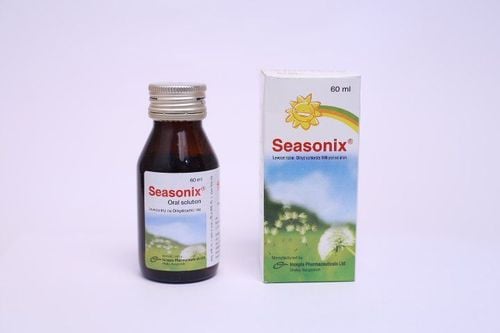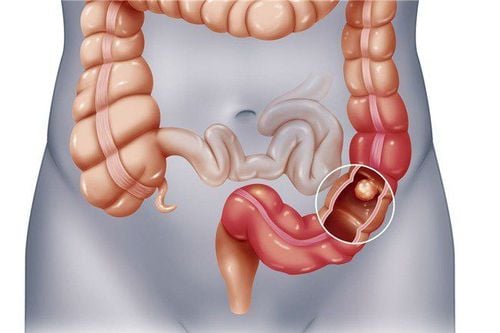This is an automatically translated article.
Nasopharyngeal cancer is more likely to occur in people with unhealthy lifestyle habits and family history. When there are symptoms of flu, runny nose that cannot be cured, the patient should go to the doctor to check the throat early for timely treatment.1. An overview of nasopharyngeal cancer
Throat cancer is a very dangerous disease. The disease manifests in the throat, making patients confused with respiratory diseases, so it is subjective, when detected, it is often at a late stage and develops quickly. In Vietnam, the rate of people with oropharyngeal cancer is 12%, accounting for a rather high rate compared to other cancers. Among them, up to 70% of patients with nasopharyngeal cancer are found in the late stages, making treatment very difficult.The cause of oropharyngeal cancer is still not exactly determined, there are only a number of factors that increase the risk. Because it is a cancer, long-term factors such as EBV or HPV infection, polluted living environment (frequently exposed to smoke, dust, toxic substances), eating habits (eating a lot of food) salted products such as salted eggs, salted fish, pickled cucumbers), drinking a lot of alcohol, smoking, genetic factors (people who have a family member with oropharyngeal cancer have a higher risk of getting the disease than the average person). common) and age (the older you get, the higher the risk).
2. Signs of early stage nasopharyngeal cancer
In the first stage, also known as the incubation period, the tumor begins to form silently, then symptoms similar to respiratory diseases such as sore throat and flu make the patient subjective.2.1 Sore throat, hoarseness This expression shows that the tumor is growing, causing damage to healthy cells and compressing organs. The tumor begins to press on the lymph node causing a burning pain in the throat when swallowing saliva. After a few days, the throat began to hurt worse leading to hoarseness. Although the above symptoms are easy to confuse, they can be distinguished from other respiratory diseases by a common feature that is often pain on the same side of the throat, increasing gradually and taking medication does not help.
Therefore, people with the above respiratory symptoms should pay more attention to the differential symptoms. If you have self-medicated for illnesses such as colds, sore throats, etc. but do not get better, lasting 3 weeks or more, you should go to a specialized facility to screen for oropharyngeal cancer immediately.
2.2 Nasal congestion The typical symptom of nasopharyngeal cancer is a stuffy nose on one side, stuffy at first, accompanied by nosebleeds. Having this symptom is because the sore throat affects other organs in the respiratory tract, and weakens the immune system, creating conditions for viruses and bacteria to cause disease.
2.3 Cough with phlegm Cough in nasopharyngeal cancer is a persistent and productive cough. Over-the-counter cough and cold medicines only relieve symptoms temporarily.
2.4 Headache The headache is dull in nature and comes in waves. Because the pain is only transient, mild in severity, it hardly bothers the patient.
2.5 Tinnitus Manifestations are tinnitus in one ear, sometimes feeling like hearing a tick in the ear.
2.6 Swollen lymph nodes

Người bị ung thư vòm họng có nổi hạch ở vùng cổ, dùng tay sờ vào 2 vị trí hạch dưới cằm có thể phát hiện dễ dàng
In general, these symptoms are similar to common respiratory illnesses. However, if you pay close attention, you will find out that in nasopharyngeal cancer, the runny nose or sore throat is usually concentrated on one side of the throat, with long-term symptoms, so taking drugs often has no effect. People at risk should pay attention to monitor the disease and seek medical attention immediately if symptoms persist.
3. Diagnosis of early stage nasopharyngeal cancer
When monitoring the disease, detecting symptoms with the characteristic features mentioned above, it is recommended to go to the doctor and screen for oropharyngeal cancer. When going to the doctor, it is necessary to clearly state the symptoms, especially the distinguishing symptoms related to oropharyngeal cancer, so that the doctor can more easily detect and prescribe treatment.3.1 Examination The doctor will do a head-to-neck look to check the lymph nodes. Then, the examiner is asked to open the mouth to examine the organs in the mouth such as the tongue and the nasopharynx.
3.2 Throat Endoscopy Use specialized endoscopic instruments to detect abnormalities in the nasopharynx. Tumors that grow large often cause damage to healthy cells, causing them to swell. Throatoscopy can help detect tumor location and size.
3.3 X-Rays From X-ray images can determine details related to the tumor such as size, shape and extent of impact on soft tissues. In addition, to help determine more accurately, the indications for CT tomography, ultrasound can be given.
4. Treatment of early stage nasopharyngeal cancer
Like other cancer treatments, the most commonly used method in the treatment of oropharyngeal cancer is chemotherapy and radiation therapy. In addition, in the early stages, surgery can be effective because the cancer has not metastasized, but surgery is in the nasopharynx, so the level of danger is also higher.4.1 Radiation Therapy Radiation therapy uses high-energy rays to destroy cancer cells. For small nasopharyngeal tumors, external beam radiation therapy may be the only treatment needed. In other cases, treatment may combine radiation therapy with chemotherapy.
Another type of radiation therapy, internal beam radiation therapy (proximal radiation therapy), is commonly used in recurrent nasopharyngeal cancer to more effectively reach and kill cancer cells.
4.2 Chemotherapy Chemotherapy is the use of chemicals to kill cancer cells. Chemotherapy drugs can be pills, intravenous, or both. Chemotherapy can be used to treat nasopharyngeal cancer in three ways:
Chemotherapy given at the same time as radiation therapy: When combined with radiation therapy, chemotherapy can increase the effectiveness of radiation therapy. However, the side effects of chemotherapy plus the side effects of radiation therapy can be overwhelming for many patients. Chemotherapy after radiation therapy: Chemotherapy after radiation therapy aims to destroy any remaining cancer cells in the body, including metastatic cancer cells. However, the effectiveness of the method is largely determined by the patient's tolerance. Many people cannot tolerate the side effects and have to discontinue treatment.

Hóa trị là sử dụng hóa chất để tiêu diệt tế bào ung thư
Cancer treatment is expensive, patients need patience and a lot of effort to overcome psychological obstacles during treatment. Treatment combined with a nutritious diet can help restore better health. Patients also need to adhere to the notes that the doctor has advised after the chemotherapy and radiotherapy sessions to slow the recurrence of the disease.
5. Methods to improve health for people with oropharyngeal cancer

Kiêng hoàn toàn thuốc lá, rượu bia và các đồ uống có cồn, có gas
Completely abstain from smoking, alcohol and alcoholic and carbonated drinks Do not eat salty foods, salty foods such as salted meat, salted fish, fermented foods such as pickles, salted tomatoes Do not eat foods that are too hot or too cold Exercise sports to increase health and increase the body's resistance Currently, early cancer screening is considered a perfect measure in timely detection and treatment of all types of cancer. Reduce the cost of treatment and especially reduce the mortality rate in patients. Vinmec International General Hospital always deploys and introduces to customers Early cancer screening at Vinmec - Peace of mind to live well to help with gene testing, imaging, and biomarkers for tumor detection. Soon. Vinmec International General Hospital has many packages of early cancer screening.
Only one gene test can assess the risk of 16 common cancers in both men and women (lung cancer, colorectal cancer, breast cancer, pancreatic cancer, neck cancer) uterine cancer, stomach cancer, prostate cancer, oropharyngeal cancer....) Early detection of early signs of cancer through imaging, endoscopy and ultrasound. The operation is simple, careful and accurate. A team of well-trained specialists, especially in oncology, are capable of handling cancer cases. With facilities, advanced and modern medical equipment and a team of doctors with deep expertise and experience. At Vinmec, the examination process becomes quick with accurate results, saving costs and time for patients.
Please dial HOTLINE for more information or register for an appointment HERE. Download MyVinmec app to make appointments faster and to manage your bookings easily.













